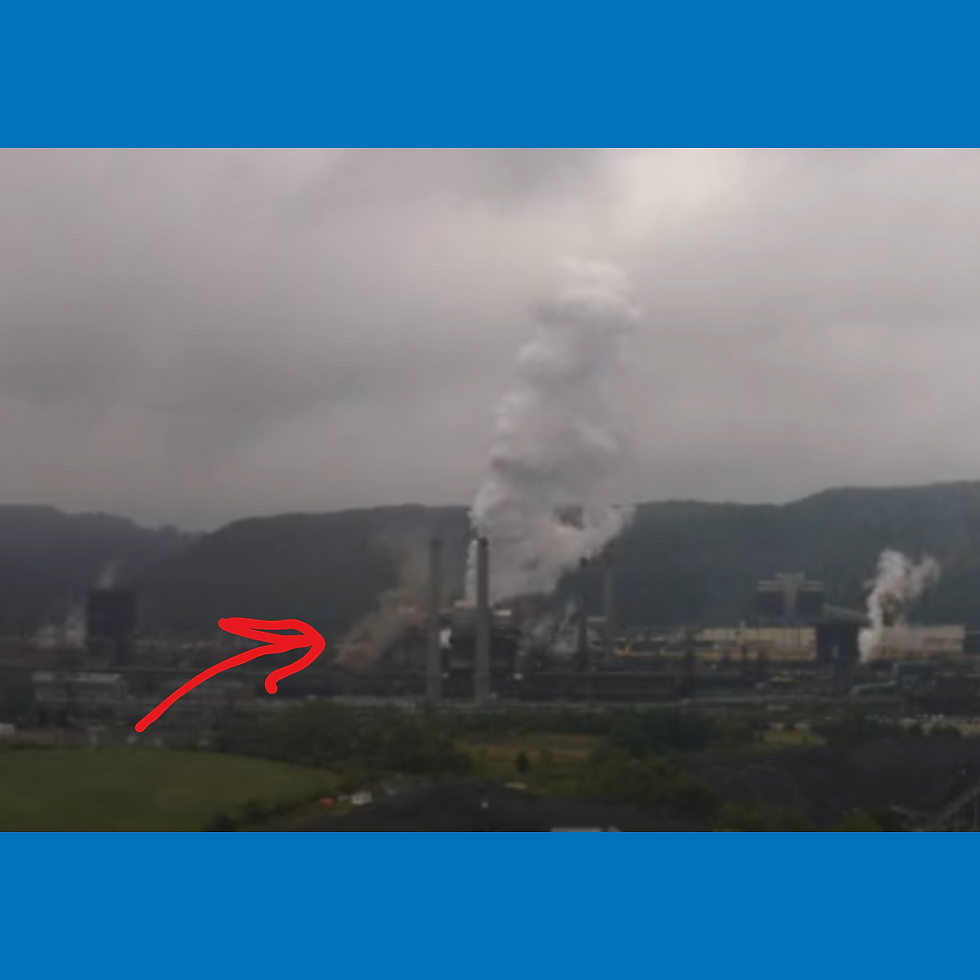Clairton Coke Works Explosion: What Comes Next with Air Quality (And Why We Need YOU)
- Group Against Smog & Pollution

- Aug 14, 2025
- 3 min read

Yes, public officials, the Allegheny County Health Department, regulatory and citizen monitors all confirmed that before, during, and after Monday's deadly explosion at the Clairton Coke Works, air pollution levels were within the scope of what is typical in the Mon Valley (awful baseline, but here we are).
However, that doesn't mean Monday's incident won't precipitate others.
In fact, if past performance is a predictor of future behavior, U.S. Steel's Clairton Coke Works could experience subsequent emissions events that impact public health and quality of life for local residents.
A History of Non-Compliance
Let's face it: Decades of breakdowns, explosions and lawsuits have taught us we must ensure that regulators, advocates, and residents all work to keep a vigilant eye on plant operations over the next few weeks.
We know Allegheny County Health Department is doing additional monitoring (read more on that here). However, Allegheny County is also home to air quality organizations and tech tools as well as a burgeoning network of citizen monitors so we can - collectively - be more aware than ever of abnormalities with Mon Valley Works emissions.
Case in point: This morning, GASP staff reviewed Breathe Cam footage and noted bursts of what appeared to be dark brown fugitive emissions that occurred for about an hour on and off.
Here's what it looked like:

We took screen grabs and made sure to send that documentation to the Allegheny County Health Department (ACHD) and we hope if and when you see, hear, or smell something concerning in the aftermath of Monday's tragic explosion, that you, too, make a phone call or send a written report letting our local health officials know what you are dealing with as a community member.
What Now?
As we await the cause and origin finding and the findings of promised investigations into what exactly went wrong, we wanted to provide some basic information about what U.S. Steel’s Title V permit requires the company to provide to ACHD in the aftermath of an incident like the one we saw Monday.
At both Clairton Coke Works and Edgar Thomson, U.S. Steel is required to take certain actions “in the event that any air pollution control equipment, process equipment, or other source of air contaminants breaks down in such manner as to have a substantial likelihood of causing the emission of air contaminants in violation of this permit, or of causing the emission into the open air of potentially toxic or hazardous materials.”
Those actions include:
Notifying ACHD “immediately” but no later than 60 minutes after the breakdown.
Providing written notice to ACHD within seven days after the incident.
And those notices - no matter oral or written - need to contain a spate of information including:
Identification of the equipment that broke down, including location and permit number
The nature and probable cause of the breakdown
The expected length of time the equipment is expected to be inoperable and emissions will continue
Identification of what specific materials (and their quantities) that are being emitted and a statement concerning their toxic qualities “including its qualities as an irritant, and its potential for causing illness, disability, or mortality”
Measures taken or being taken to minimize the length of the breakdown
And that additional info requested by ACHD “be submitted as expeditiously as practicable…unless otherwise directed by the department.”
The permits also require U.S. Steel to notify ACHD when the condition causing the breakdown is placed back in operation “by no later than 9 a.m. on the next County business day.”
GASP intends to file a public records request to ACHD and other investigative agencies regarding the incident and will report back what it yields.




You all are just not doing enough. The Mon Valley works need to be shut down before they kill anymore of us. The poisoning is enough. GASP can help, by buying the Mon Valley Works from Nippon Steel and directing the workers in the dismantling of the factories, loading the scrap on board river barges and shipping them down the river to Nucorp new factory in Mason County for recycling. Allegheny can reduce its indigent medical expenses by remediating the land and selling it on for clean use puropses. Do this and Allegheny county will save billions of dollars.